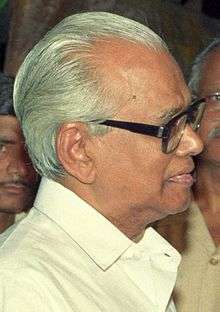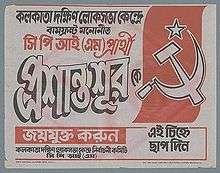Prasanta Sur
Prasanta Sur (Bengali: প্রশান্ত শূর) (1 January 1923 – 29 February 2008) was the convenor of the Kolkata district Left Front committee and became the first Left Front Mayor of Kolkata in 1969.[1] A member of the state committee of Communist Party of India (Marxist), Sur was the urban development minister in the first Left Front government in 1977. Later, he also held key portfolios like health and refugee rehabilitation. He died on 29 February 2008, aged 85, after suffering from age-related problems.[2]
Prasanta Sur প্রশান্তচন্দ্র সুর | |
|---|---|
 | |
| Minister of Health & Urban Development | |
| In office 1977–1996 | |
| Preceded by | Zainal Abedin |
| Succeeded by | Dr. Surjya Kanta Mishra |
| MLA | |
| In office 1977–1996 | |
| Preceded by | Pankaj Kumar Banerjee |
| Succeeded by | Pankaj Kumar Banerjee |
| Constituency | Tollygunge |
| Personal details | |
| Born | 1 January 1923 Barisal, East Pakistan |
| Died | 29 February 2008 (aged 85) Tollygunge, South Kolkata, West Bengal |
| Nationality | Indian |
| Political party | Communist Party of India Communist Party of India (Marxist) |
| Residence | Tollygunge |
| Alma mater | University of Calcutta |
| Profession | Politician, social worker |

Family background and early life
Sur's father was Rai Saheb Nagendra Nath Sur, a member of the landed gentry of (erstwhile) east Pakistan. The Rai Saheb disowned him after Prasanta Sur joined the Communist movement in Kolkata. An obstinate and proud man, the Rai Saheb continued to live at his home in East Pakistan until he was assassinated by the Pakistani Army in 1971. He Was one of great leaders like Saroj Dutta, Jyoti Basu, Geeta Mukherjee and Hare Krishna Konar.
Sur qualified as a lawyer but never practiced law as he became a full-timer in the CPI.
Refugee movement
Sur joined the Communist Party of India in 1949. After some trade union work, he plunged himself into organising the unending stream of the refugees from East Pakistan, who crossed the border in search of new life in West Bengal. He looked after the initial settlement of the refugees in what came to be known as jabar dakhal colonies (or squatters’ enclaves). There was practically no support from the state government.[3]
Sur and his colleagues in the CPI built up the united council of refugees that led the movement for recognition of the rights of the refugees. He succeeded, almost single-handedly, in building up the large and bustling Netaji Nagar colony of Tollygunj. It was the decade of the late 1950s and early 1960s.[3]
Electoral politics
When CPI split up, he joined the Communist Party of India (Marxist).
During the repression of the Communists in the late sixties Sur had to remain underground and was also in prison. In 1969 he became the first Communist Mayor of Kolkata.
In 1968, he entered assembly election scenario. He won the Tollygunge assembly seat successively in 1977, 1982, 1987 and 1991.[4]
Urban development
Sur was urban development minister from 1977 till 1982. It was under him that the then Kolkata Metropolitan Development Authority really got off the ground, becoming a prime agency for development.
The UF government came to office and was gone before it could really dig itself in. Nevertheless, this was not the case at the Kolkata Municipal Corporation. There the Left won the civic polls, and stayed in office until 1972. Prasanta Sur had become the first Communist mayor of metropolis, and commenced the move that was aimed at reorienting the developmental drive of the civic body towards the mass of the people, especially the urban poor, and the refugees who had kept coming to the city and its surroundings, all the while.
Prasanta Sur was the urban development minister of the Left Front government from 1977 till 1982, it was under him that the then Calcutta Metropolitan Development Authority (CMDA, now KMDA), really got off the ground, becoming a prime agency for development from the moribund state it had been put in.
A host of roads, bridges, and the Sealdah fly-over were constructed under him despite violent opposition by both factions of the Pradesh Congress (Subrata Mukherjee had then split from and was virtually at war with the Somen Mitra-led fraction). He was assaulted in a brutish way—he carried the marks on his face well into his sunset years—when going on a house-to-house campaign in the Sealdah region, explaining to the people the need for the fly-over to be constructed. Sur was also the founder of Netaji Nagar Day college.
Health
Prasanta Sur was also a great success as a health minister of the LF government (1987–1996), and he especially turned his attention to the development of a rural health network while strengthening the government-run hospitals and research centres in the cities, large, and small.
Later life and death
In 1998, he lost to Mamata Banerjee in the Calcutta South (Lok Sabha constituency).[5]
A simple man of humble disposition, and uncomplicated lifestyle, he, thereafter, devoted himself full-time to party work.[3]
He died on 29 February 2008. As per his wishes his body was donated for medical research to Nilratan Sarkar Medical College in Kolkata.
The last journey from Alimuddin Street to NRS Hospital was attended by thousands of party workers and ordinary people paying their last salute to the strains of the "Communist Internationale".
References
- "Prasanta Sur dies after long illness". UNI. newkerala.com, 29 February 2008. Retrieved 2 March 2008.
- "Prasanta Sur passes away". Times of India, 1 March 2008. 1 March 2008. Retrieved 2 March 2008.
- "Comrade Prasanta Sur (1923-2008)". Weekly organ of Communist Party of India (Marxist). People’s Democeacy, Vol XXXII, No. 10, 9 March 2008. Retrieved 24 March 2008.
- "150 - Tollygunge Assembly Constituency". Partywise comparison since 1977. Election Commission of India. Archived from the original on 9 February 2005. Retrieved 25 March 2008.
- "Partywise comparison since 1977 Lok Sabha elections". 23 - Calcutta South Parliamentary Constituency. Election Commission of India. Archived from the original on 7 September 2005. Retrieved 25 March 2008.